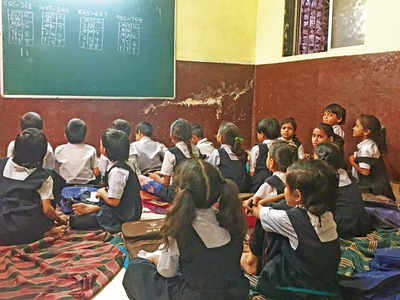
While New Year was celebrated the world over, 2020 did not bring any good news to this 20×20 ft room BMC-run Jarimari Municipal Urdu School in Kurla, Mumbai. Established in 1971 and housed in a donated building, the school has around 400 pupils who learn a hard lesson every day, sitting on the floor with no benches and even no drinking water being available for them.
The kids also have to use a single washroom and face frequent power outages making them suffer more than they already do in poorly ventilated rooms. Mumbai Mirror reported that the school houses grades 1 to 4, with three divisions each, in the first shift from 7:30 A.M. to 12:30 P.M. and three divisions of grade 5 from 12:45 P.M. to 5:30 P.M., in three rooms. Speaking to the paper, L-Ward Administrative Officer (schools) Saile Surve said that the acute space crunch did not allow them to put benches. “On the floor, we can accommodate 35 students. With benches, the capacity will go down to 20”, she said adding that they couldn’t decline education to anyone as the school was established to impart education to kids from the local community. “Benches will force us to restrict the enrolment of students,” she said.
Though the Jarimari School isn’t the only Urdu school in the area, it is preferred by parents for its proximity. A senior teacher told the Mumbai Mirror, “There are two Urdu primary schools run by the BMC – Kajupada BMC Urdu School and Gulshan-e-Millat Urdu High School – but ours is more popular. Most parents are engaged in household work in this area and like the idea of their children being close by. They fear for their safety and want to be available at all times.”
While the Right to Education (RTE) Act makes it compulsory for school to provide imperative infrastructure like all-weather buildings, a library, separate toilets for boys and girls, drinking water and playgrounds, the headmistress of the Jarimari School manages to only buy five liters of drinking water from school funds and has not been able to do much about the common washroom for staff and students that leaks every monsoon.
While local activists say that they have pleaded with the BMC to help out with the situation, the BMC has washed its hands off all responsibility. Mahesh Palkar, BMC education officer said that the school building was neither owned by the BMC nor came under its jurisdiction. He said, “It’s a rented building, so we cannot renovate the space. Besides, there is no space in the neighbourhood to construct a new school. We are doing our best with limited resources.”
However, the pitiable infrastructure notwithstanding, it is heartening to see that the parents and teachers have forged a good bond. The teachers have waxed eloquent about the students and the parents have praised the teachers for stepping out of their comfort zones and imparting education for the children.
Related: